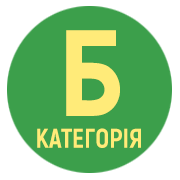PEDAGOGICAL POTENTIAL OF THE SCHOOL COURSE OF UKRAINIAN LITERATURE IN THE FORMATION OF MATHEMATICAL COMPETENCE
Abstract
The article highlights the issue of the competence orientation of school education of Ukrainian literature, substantiates the need to adjust the educational process in accordance with the tasks in the State Standard of Basic Secondary Education and current programs on the formation of the ability of students to use mathematical tools in various spheres of life, perception and attitudes regarding the importance and significance of mathematics. The definition of mathematical competence as key was proposed in the article, taking into account the peculiarities of the educational subject: focusing on the literary ‘content core’, combining Ukrainian literature and mathematics through the integration of subject areas, internalizing the content of literary and mathematical activities. The content of the course in the aspect of defining the programming artistic works of Taras Shevchenko, Leonid Hlibov, Stepan Vasylchenko, Vasyl Symonenko, Lina Kostenko and others with elements of mathematical content was analysed; with ‘mathematically’ determined extraordinary forms, textual components; which appear as a standard of beauty and harmony, understood through the prism of the golden (silver) proportion. A method of using the structural-functional model of mathematical competence formation in the teaching of Ukrainian literature was proposed. The educational situations of the competence-oriented lesson were outlined: ‘The riddle as a type of small genres of folklore. Mathematical riddles’ for the 5th grade. It was clarified that a competent graduate of the basic school is able to trace the directions of the relationship between mathematics and literature, to find examples of mathematical content in literary texts, to solve them, to explain the artistic role in the content of works, the patterns of poetic harmony; mentally active; motivated to apply mathematical knowledge for professional, social, creative self-realization.
References
2. Бондаренко Ю.І. Формування математичної компетентності в процесі шкільного навчання художньої літератури. Психолого-педагогічні науки. 2020. № 2. С. 19–26.
3. Державний стандарт базової середньої освіти. URL: http://www.mon.gov.ua (дата звернення: 18.04.2023).
4. Методичний путівник Нової української школи: математична освітня галузь / за заг. ред. О. Кітової. Краматорськ, 2021. 37 с.
5. Українська література. 5-9 класи. Програма для загальноосвітніх навчальних закладів. URL: http://www.mon.gov.ua (дата звернення: 15.04.2023).
6. Якість природничо-математичної освіти учнів шкіл міста Києва: аналітичний звіт / Л.М. Гриневич, Л.Л. Хоружа та ін. Київ, 2021. 160 с.






